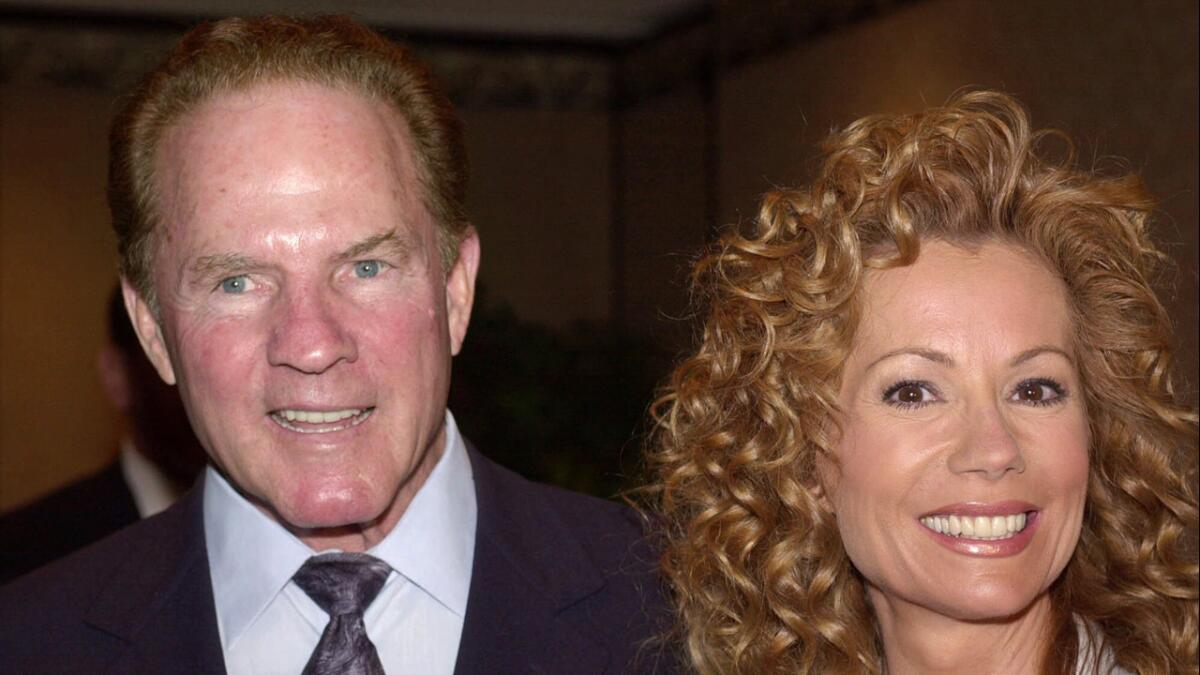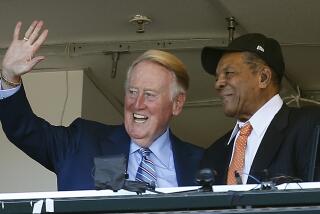Frank Gifford remembered as ‘unassuming’ and ‘engaging’

Sports announcer Frank Gifford and his wife, entertainer Kathie Lee Gifford, arrive at the New Dramatists Awards Luncheon in May 2000.
Even though he was a megastar in two industries — pro football and sports broadcasting — Frank Gifford was always a little uncomfortable when he was too much in the spotlight. He didn’t like to draw attention to himself.
Friends recalled that Monday, a day after Gifford, 84, died unexpectedly at his home in Connecticut. They remembered him as quiet, humble and low-key, even though he was among the greatest players in New York Giants history and a fixture in the “Monday Night Football” booth for a record 27 years.
Then there was the night at that restaurant in Indianapolis…
As was typical, Gifford was out to dinner with his co-workers from that groundbreaking TV program, and they were eating at St. Elmo’s Steakhouse, known for shrimp cocktails so spicy they’re practically radioactive.
Gifford didn’t know this special dish, and his playful cohorts had no plans to warn him. They watched in amusement as he took his first bite.
“He’s in the middle of telling the story, and he dips into that hot horseradish,” recalled Steve Hirdt, the show’s longtime statistical whiz. “All of a sudden he just yelps. Every head turned. It was the only time in my 16 years with Frank on the show, or since, where he did anything to cause people to say, ‘Who’s that?’”
That stood in stark contrast to Gifford’s booth mate, the bombastic Howard Cosell.
“Cosell was the type of guy who would wear his ABC blazer and stand outside the hotel, right outside the ABC office building in New York, just in case people didn’t recognize him enough,” Hirdt said. “He liked to wear the blazer just in case there were a couple on the fence about whether that was really Cosell or not.”
If there were anyone who earned the public adulation, it was Gifford. Not only did he score a record 78 touchdowns with the Giants, a mark that has stood for 50 years, but he called a record 411 regular-season games on Monday nights.
“That number is an understatement because the packages included preseason games, Pro Bowls, Super Bowls — I think he did three Super Bowls at ABC and did two at CBS,” said Hirdt, executive vice president of Elias Sports Bureau. “He was a guy who didn’t shirk from the prime-time spotlight. But in a personal sense, he was totally unassuming.”
Al Michaels is second on that list of Monday night longevity, working 323 regular-season games and alongside Gifford for 12 seasons. When Michaels came onboard, he became the play-by-play man, and Gifford moved to color analyst. Gifford worked more than twice as many games as the iconic Cosell, who was in the booth for fewer than 200.
“Frank was very proud of the fact that in 27 years he did not miss a single game,” Michaels said. “He had a Cal Ripken streak in those 27 years.”
That included working through winter colds and sore throats, naturally, but also immediately after the death of his mother. He knew how to play with pain.
Gifford was a color analyst on CBS in 1970, the year “Monday Night Football” made its debut on ABC, but legendary producer Roone Arledge brought him to ABC in the second year of the show and made him the play-by-play announcer alongside Cosell and Don Meredith. The three-man booth was a novel concept at the time.
“Roone felt it was a great opportunity to put three really high-profile people together,” Michaels said. “So for Frank it was an opportunity to be a part of a marquee trio. And in those years you could almost do play-by-play in the manner of a public-address announcer. ‘It’s third-and-4 at the 26.’ Now you’ve got Cosell, now you’ve got Meredith, so there was far less time for a play-by-play guy. So Frank did a little bit of learning on the fly.”
Then again, Gifford was just as comfortable doing his job, then sitting back and listening. He didn’t need to be center stage, a quality his friends appreciate more now.
“Frank never drew attention to himself,” Michaels said. “He was always very respectful, very courteous. If people came up to him, he was very engaging, would always make them feel comfortable. If you were around him, he paid attention to you — I’m talking about people he didn’t know. Frank had a way of putting people at ease.”
More to Read
Go beyond the scoreboard
Get the latest on L.A.'s teams in the daily Sports Report newsletter.
You may occasionally receive promotional content from the Los Angeles Times.











